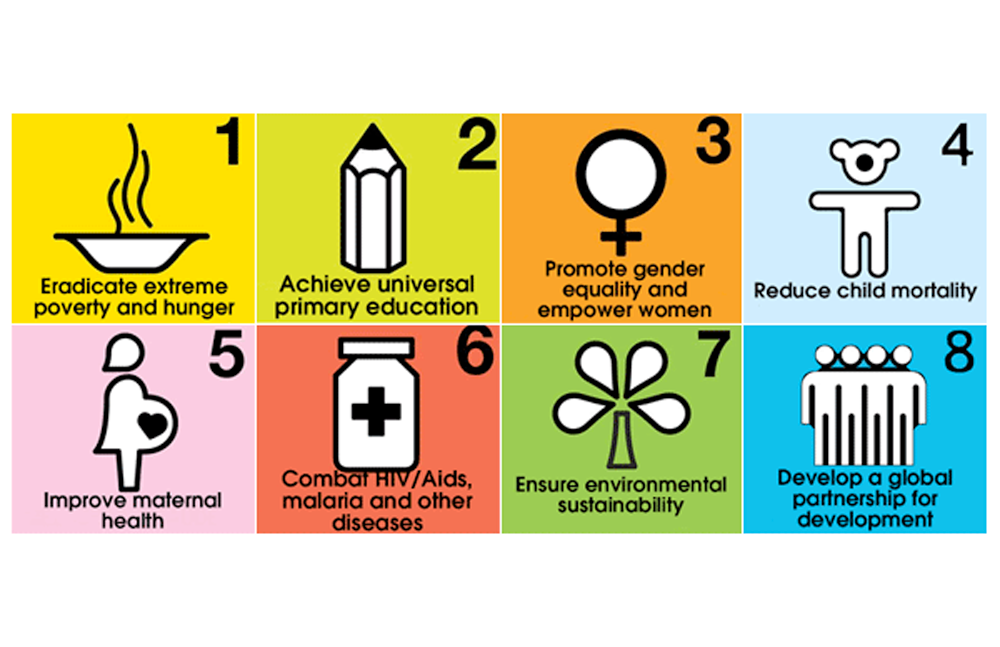Gavi, the Vaccine Alliance was established in 2000 to accelerate access to new, life-saving vaccines in the world’s poorest countries. In the same year, world leaders set the Millennium Development Goals (MDGs) to advance the health of women and children, gender equality, education, the environment and global partnerships.
The global community failed to meet many of the MDG targets by their 2015 deadline, paving the way for a new set of Sustainable Development Goals. Still, the power of vaccines has provided health benefits that accrue to all the MDGs.
MDG 1: END POVERTY AND HUNGER
Vaccines protect children from death and disability, enabling families to break out of a cycle of poverty and ill health.
- Healthy children reduces burden of care on parents, improving their productivity and freeing them from crippling medical costs, allowing more to be spent on food and education.
- In 2015, Gavi supported countries with a Gross National Income of less than US$ 1,580 per person, per year.
MDG 2: achieve universal primary education
Healthy, immunised children are better able to attend school and learn.
- Protecting children from infectious diseases enables them to attend school more regularly.
- Vaccination raises children’s IQ, improves their cognitive development, physical strength and educational achievements.
- Studies in the Philippines and Bangladesh show routine vaccination increases cognitive test scores of children and improves likelihood of school attendance. Better test scores and more schooling raises potential earnings.
MDG 3: promote gender equality and empower women
In most countries, girls and boys have the same likelihood of being vaccinated.
- Gavi’s gender policy recognises equal access as key to expanding vaccine coverage and making immunisation more equitable.
- Healthy, immunised children frees women’s time for other activities.
- Gavi is supporting two vaccines that directly benefit women’s health: HPV and rubella vaccines.
MDG 4: reduce child mortality
Globally under-five deaths declined by more than half between 1990 and 2015 to less than 6 million.
Gavi and its partners have contributed to the remarkable reduction in child mortality through improving access to immunisation in the world’s poorest countries.
- Immunisation is among the most successful and most cost-effective health interventions, saving an estimated two to three million lives every year1.
- Over 80% of children in the world are reached by national immunisation programmes Immunisation is closer to universal coverage than most other health interventions.
- Pneumonia and diarrhoea kill between two to three million children each year. Gavi supports pneumococcal and rotavirus vaccines against these leading child killers.
MDG 5: improve maternal health
Gavi supports vaccines benefitting women's health.
- 266,000 women die each year from cervical cancer, over 85% in developing countries where it is a leading cancer killer of women. Safe and effective HPV vaccines can prevent the vast majority of cervical cancer cases.
- Rubella vaccine protects pregnant women against an infection that can cause miscarriage and stillbirth, and severe birth defects in babies. Gavi provides catalytic support through measles-rubella campaigns.
- Gavi supported a global drive to eliminate maternal and neonatal tetanus. During the campaign, around 40 million women in over 30 low-income countries were vaccinated.
MDG 6: combat HIV/AIDS, malaria and other diseases
Vaccinating HIV-positive adults and children can help to protect them from pneumonia, diarrhoea, HPV infection and other diseases.
- Vaccinating children also benefits the non-vaccinated by reducing disease transmission within the community.
- This is especially important for HIV-positive people who are more vulnerable to pneumonia, HPV infection and other diseases.
MDG 7: ensure environmental sustainability
Pneumonia and diarrhoea are leading killers of children.
- Tackling them requires an integrated approach to pneumonia and diarrhoea control.
- Pneumococcal and rotavirus vaccines can re-vitalise other pneumonia and diarrhoea control interventions including safe drinking water and sanitation, thereby saving many more lives.
MDG 8: develop a global partnership for development
Gavi is an innovative public-private partnership.
- Brings together key partners in immunisation to distribute new and underused vaccines to the world’s poorest countries.
- Uses innovative financing mechanisms to mobilise additional funds for health.
- Shapes markets reducing vaccine prices by pooling demand and attracting new manufacturers, including those from emerging economies, to encourage healthy competition.
- Strengthens health systems reducing bottlenecks in delivering vaccines and improving immunisation outcomes.
- Maximises aid effectiveness channelling funds through national health plans and budgets, thus reducing transaction costs for countries.
- Uses results-based financing supporting countries to increase immunisation coverage.
